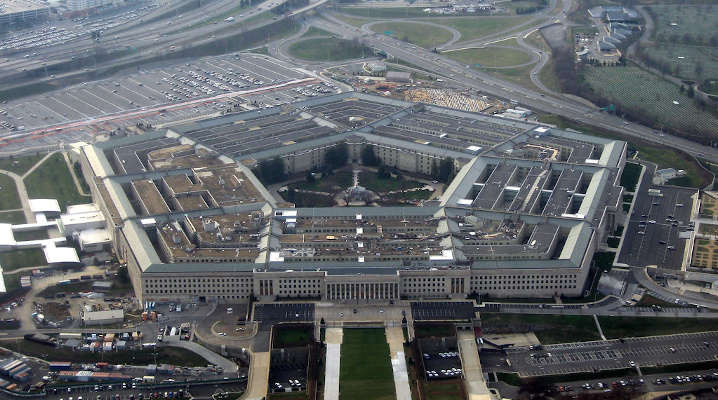 CLOUD
CLOUD
 CLOUD
CLOUD
 CLOUD
CLOUD
In a document newly unsealed Friday, Amazon.com Inc. argued that Microsoft Corp.’s winning bid for a $10 billion Pentagon cloud computer contract should have been disqualified because the software giant’s bid called for using a data storage system that didn’t meet requirements.
On the basis of that argument, Amazon Web Services Inc., the retail giant’s cloud computing unit, won a judge’s approval Feb. 13 of its request for a preliminary injunction against Microsoft’s work on the Joint Enterprise Defense Infrastructure or JEDI contract, which is intended to modernize the DOD’s technology infrastructure. Although that injunction remains in place, the outcome of Amazon’s lawsuit remains to be seen.
In the heavily redacted filing citing the opinion of Judge Patricia E. Campbell Smith, AWS cited a “host of errors” in Microsoft’s bid, in particular a “noncompliant storage solution.”
The Department of Defense, AWS said, “should have found [intervenor-defendant’s] technical approach unfeasible, assigned a deficiency, and eliminated Microsoft from the competition.” It also alleged that Microsoft price scenario “fails to comply with the requirement that storage be ‘highly-accessible,’ a term defined as ‘online and replicated storage.’”
The document also noted that “rather than dispute the applicable storage requirement,” the DOD made two arguments against AWS’ complaint. “First, defendant contends that plaintiff ‘seeks to elevate superficial labels over technical performance,’ and second, that if correct, plaintiff ‘would have been as technically deficient as [intervenor-defendant], and so would be in no position to complain of prejudice.'”
However, Judge Smith said in her ruling, Amazon “likely is correct” that the DOD should have assigned a deficiency to Microsoft’s bid and that Amazon would have had a better chance of getting the deal, which it was heavily favored to win, if the DOD hadn’t erred. “In the context of a procurement for cloud computing services, the court considers it quite likely that this failure is material,” she wrote.
For its part, Microsoft argued that wasn’t a sufficient reason to evaluate the bid differently than it did.
“The decision disagreed with a lone technical finding by the Department of Defense about data storage under the evaluation of one sub-element of one price scenario,” Frank X. Shaw, Microsoft’s corporate vice president of communications, said in a statement Friday. “While important, there were six pricing scenarios, each with multiple sub-elements, and eight technical factors, each with numerous subfactors evaluated during the procurement. The decision does not find error in the Department of Defense’s evaluation in any other area of the complex and thorough process that resulted in the award of the contract to Microsoft.”
Amazon has referred in the past to what it views as improper pressure from President Donald Trump that caused DOD officials to award JEDI to Microsoft instead. In its initial suit filed in December, AWS said that the interference took the form of “public and behind-the-scenes attacks” by Trump against Amazon Chief Executive Officer Jeff Bezos.
AWS CEO Andy Jassy told SiliconANGLE in November that he believes there was “a significant amount of political interference” and added that “in any objective apples-to-apples comparison of our platform versus others, you don’t end up with the conclusion that they made.”
Bezos also owns the Washington Post, which has run many hard-hitting stories about Trump. According to the New York Times, “a speechwriter for former Defense Secretary Jim Mattis, who over time became an enthusiast of moving Pentagon operations to the cloud, alleged in a book scheduled for publication next week that Mr. Trump had wanted to ‘screw’ Amazon and give the contract to another company.”
Last month, two watchdog groups filed an amicus brief in support of Amazon. Protect Democracy and Citizens for Responsibility and Ethics in Washington or CREW both said they take no position on whether or not AWS should be awarded the JEDI contract but argued that a dangerous precedent would be set if a federal contract is awarded because of pressure from a sitting U.S. president.
Support our mission to keep content open and free by engaging with theCUBE community. Join theCUBE’s Alumni Trust Network, where technology leaders connect, share intelligence and create opportunities.
Founded by tech visionaries John Furrier and Dave Vellante, SiliconANGLE Media has built a dynamic ecosystem of industry-leading digital media brands that reach 15+ million elite tech professionals. Our new proprietary theCUBE AI Video Cloud is breaking ground in audience interaction, leveraging theCUBEai.com neural network to help technology companies make data-driven decisions and stay at the forefront of industry conversations.